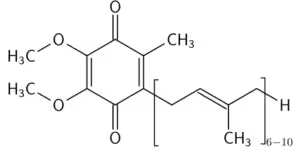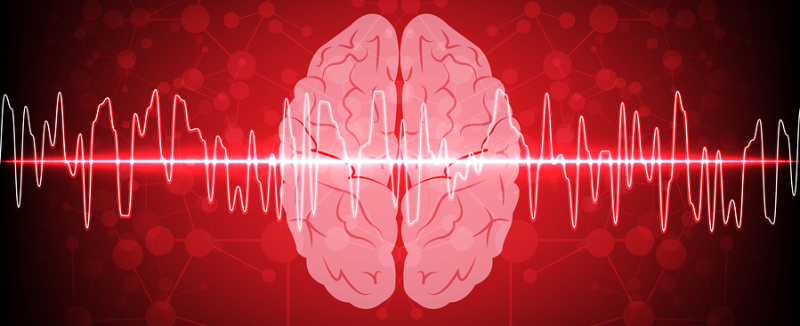Table of Contents
Coenzyme Q10 (CoQ10) (2,3-dimethoxy-5-methyl-6-decaprenyl-1,4-benzoquinone) is a natural antioxidant synthesized by your body. It’s also known as “ubiquinone” because it is ‘ubiquitous’ in the human body. CoQ10 is used by every single cell.
CoQ10 is required for the energy production that takes place in your mitochondria . It takes fat and other substances and converts them into usable energy.
Brain cells have a higher concentration of mitochondria than most other cells in your body. These mitochondria are like little power plants inside each cell. They even have their own DNA.
The source of life and death for neurons lies in mitochondria. Without healthy mitochondria, the natural function of each cell is damaged. And the life of that cell can come to a premature end.
CoQ10 is also a powerful antioxidant. And helps protect your cells from free radical (oxidative) damage. Free radicals are oxygen atoms missing electrons. This makes them highly reactive which wreaks havoc in your tissues and DNA.
Research shows CoQ10 prevents oxidative damage in your brain. Protecting the health of your brain cells.[i]
Coenzyme Q10 helps:
- Protect brain cells. Mitochondria generate the neuron’s energy and control its death. CoQ10 protects mitochondria from oxidative damage and dysfunction.
- Brain energy. CoQ10 assists with ATP fuel production in mitochondria. Low levels of CoQ10 results in brain fog, slow mental processing, and cognitive decline.
- Neurotransmitters. Brain nerve cells (neurons) provide electrical signals transmitting information between neurons. This neural signaling is involved in memory, learning, cognition and recall. CoQ10 contributes to the energy production in mitochondria in each of these neurons. Keeping them functioning optimally for normal brain processing.
Overview

Coenzyme Q10 (CoQ10) is a natural enzyme synthesized in your body. It’s also known as “ubiquinone” because it is ‘ubiquitous’ in the human body. CoQ10 is used by every single cell.
Your body uses CoQ10 faster than it can produce it. So you need supplemental CoQ10 either from food or a supplement. You can get CoQ10 from eating fatty fish, beef, poultry, nuts, seeds and oils.
CoQ10 assists with ATP production that take place within mitochondria in each of your brain cells. Mitochondria are the tiny power plants that are the most fundamental source of cellular energy production. And your brain has a higher concentration of mitochondria in each cell than most other organs.
CoQ10 is also a powerful antioxidant. It protects your cells from free radical damage. Oxidative damage has been implicated in several neurodegenerative diseases including Alzheimer’s, Parkinson’s, Huntington’s, and Lou Gehrig (ALS) disease.[ii]
Coenzyme Q10 is used throughout your body. It helps produce more energy for your cells, boosts heart health, helps maintain healthy blood pressure and immune system, and reduces the signs of aging.
Here we’re talking about how CoQ10 affects your brain health and chemistry.
CoQ10: Ubiquinone vs. Ubiquinol: What’s the Difference?
Coenzyme Q10 (CoQ10) is a fat-soluble nutrient produced naturally in your body. The highest concentration of CoQ10 is in the organs that require the most energy – including your heart, liver, muscles, kidneys and brain.
CoQ10 is in the mitochondria in your cells. This is where cellular energy occurs. It acts as an electron acceptor or donor in the chain of reactions that lead to cellular energy production.
When oxidized CoQ10 (ubiquinone) accepts an electron from another molecule in the chain, it becomes Ubiquinol. And when Ubiquinol donates an electron it becomes ubiquinone. This state of equilibrium is necessary and how your body benefits from CoQ10.
The chemical difference between ubiquinone and Ubiquinol is the Ubiquinol compound contains two hydroxyl groups. This makes it more “hydrophilic”, or easier to dissolve in water. And makes it more bioavailable than ubiquinone.[iii]
In Ubiquinol-form, CoQ10 has the ability to scavenge free radicals in the mitochondria and cell membranes. Sites where free radicals inflict the most damage.
Supplement makers have been offering various forms of CoQ10 claiming to enhance bioavailability. But absorption rates vary a lot from person to person. With some people only absorbing and utilizing extremely small amounts of CoQ10.
One company, BioActives® LLC has developed a new delivery mechanism for CoQ10 using a natural compound (beta-cyclodextrin) made from potato starch. MicroActive® Q10 is a free-flowing powder with enhanced bioavailability.
Research shows that daily use of MicroActive® Q10 doubles serum (blood) levels of CoQ10 in just 3 weeks.
You can get MicroActive Q10 in the new Performance Lab® Energy formula that also contains Acetyl-L-Carnitine, R-Lipoic Acid, PQQ and BioPerine for even better bioavailability.
How does CoQ10 work in the brain?
Coenzyme Q10 boosts brain health in several ways. But two in particular stand out.
- When you supplement with enough CoQ10, you’re giving your brain cells the fuel it needs to produce adenosine triphosphate (ATP). ATP is the fuel produced by the mitochondria in your neurons.
Mitochondria are the source of life and death for neurons. They generate your neuron’s energy and control its death. But mitochondria tend to develop defects as we age.
As these defects accumulate, mitochondria start to malfunction. This results in a reduction in cellular energy production. And cells die.
The result of this dysfunction can be brain fog, cognition problems, poor memory and recall. And ultimately neurodegenerative diseases like Alzheimer’s, Huntington’s, stroke and others.[iv]
Studies show that CoQ10 protects against this cellular damage by raising energy levels. In a study with rats, scientists put CoQ10 in their chow for 10 days before giving them a toxin that caused brain lesions. CoQ10 reduced lesions by 30%. And restored energy production in neurons to nearly normal levels.[v]
- CoQ10 preserves brain function, mental illness and fights migraines. CoQ10 is essential not only in preventing brain deterioration at a structural level, but in maintaining normal function at all ages.
Studies are beginning to show some troubling associations between migraine headaches and mental health issues like depression and schizophrenia.
 Scientists don’t know for sure what causes migraines. But think it may be related to brain energy levels. Studies show that CoQ10 supplementation in children, adolescents and adults had significant decreases in frequency and length of migraines.[vi]
Scientists don’t know for sure what causes migraines. But think it may be related to brain energy levels. Studies show that CoQ10 supplementation in children, adolescents and adults had significant decreases in frequency and length of migraines.[vi]
Major depression, bipolar disorder and schizophrenia have long been considered separate health issues. Lately, they are being recognized as having mitochondrial dysfunction in common. And higher oxidative stress levels.[vii]
Just one of many studies show that depression in older bipolar adults had a significant reduction in symptoms. This was after treatment with 1,200 mg of CoQ10 per day.[viii]
How things go bad
As we get older, the chemistry in our brain cells and energy metabolism changes.
↓ Brain cell membranes degenerate
↓ Recall, reaction time and mood diminish
↓ Neurotransmitter levels decline
All of these age-related changes are contributing factors to the neurodegenerative diseases of aging, including Alzheimer’s and dementia.
But even if things haven’t degenerated to such a debilitating level, CoQ10 can help.
CoQ10 benefits
Research from thousands of studies have shown that Coenzyme Q10 will:
- Boost energy levels and stamina
- Reduce fatigue

- Reduce the possibility of age-related diseases
- Lower blood pressure
- Lower blood sugar levels
- Provide protection and energy to your brain
- Boost cerebral blood flow
How does CoQ10 feel?
Optimizing your mitochondria is one the most powerful strategies you have to extend your life. Mitochondrial dysfunction is associated with the aging process, including many age-related diseases.
So when taking CoQ10 you should feel better and more energized. Thinking should be clearer. Less fatigue and stamina improved.
Some neurohackers report feeling more fatigue while taking Ubiquinol. And actually feel better taking the less optimized form ubiquinone.
CoQ10 Clinical Research
CoQ10 was first isolated from beef hearts at the University of Wisconsin in 1957. Research continued at Merck & Company, Stanford Research Institute, and the University of Texas at Austin. Many studies from around the world have been published since.[ix]
CoQ10 can Improve Learning
A study at the University of Texas was conducted to find out if supplementing with CoQ10 or Vitamin E could help older mice learn tasks more quickly. The researchers separated groups of older mice. And gave each mouse either CoQ10, Vitamin E, or both antioxidants for 14 weeks.
The mice were run through a battery of tests assessing learning, memory and psychomotor function. The study concluded that CoQ10 combined with Vitamin E working in concert boosted performance in all tests.[x]
CoQ10 for Parkinson’s Disease
Neuron death caused by oxidative stress is implicated in a host of neurodegenerative diseases. Including Alzheimer’s, Parkinson’s and stroke.
Oxidative stress is an imbalance between the production of free radicals, and the ability of your body to detoxify the harm caused by free radicals. Exposure to toxins in your everyday environment can cause oxidative stress.
Researchers at the University of California, San Diego set out to determine if supplementing with CoQ10 could slow the progression of Parkinson’s Disease.
80 patients with Parkinson’s Disease were assigned CoQ10 dosages of 300, 600, or 1200 mg daily. The patients underwent evaluation with the Unified Parkinson Disease Rating Scale (UPDRS) at the screening, baseline, and 1-, 4-, 8-, 12-, and 16-month visits.
The research team concluded, “ Coenzyme Q10 was safe and well tolerated at dosages of up to 1200 mg/d. Less disability developed in subjects assigned to coenzyme Q10 than in those assigned to placebo, and the benefit was greatest in subjects receiving the highest dosage. Coenzyme Q10 appears to slow the progressive deterioration of function in Parkinson’s Disease”.[xi]
CoQ10 Reverses Gulf War Illness
The profound protective effect of CoQ10 on brain neurons and memory was proven in studies with soldiers who fought in the Persian Gulf War.
About one-third of the 700,000 troops deployed during the first Persian Gulf War, have been diagnosed with Gulf War Illness (GWI). Symptoms include fatigue, muscle pain, weakness, and decreased cognitive function.
 Gulf War Illness was caused by exposure to pesticides, sarin nerve gas, and other toxins during the war.
Gulf War Illness was caused by exposure to pesticides, sarin nerve gas, and other toxins during the war.
Forty-six United States Gulf War veterans participated in this randomized, double-blind, placebo-controlled study. All had been diagnosed with GWI.
The veterans were given CoQ10 in pill form, or a placebo for 3 ½ months. Researchers concluded that 80% of those receiving only 100 mg of CoQ10 during this study saw improvements with headaches, irritability, recall and muscle pain.
The degree of improvement correlated to the degree in which CoQ10 levels in the blood increased.[xii]
CoQ10 Recommended Dosage
CoQ10 can help the synthesis of ATP within mitochondria in your brain, and throughout your body. It reduces oxidative stress and damage to mitochondria. Helping to slow the aging process.
Dosing CoQ10 depends on what you’re trying to accomplish. Generally dosing for a healthy adult is 30 – 400 mg daily.
- As an antioxidant: 60 – 150 mg daily
- Muscle control problems: 300 – 3,000 mg daily
- Alzheimer’s Disease: 400 mg daily
- Heart Attack recovery: 30 – 600 mg daily
- To prevent heart disease: 200 mg daily
- Chemotherapy side effects: 50 – 90 mg daily
- Improve exercise performance: 50 – 300 mg daily
- Male infertility and Peyronie’s disease: 30 – 300 mg daily
- Diabetic nerve pain: 400 mg daily
- Weight loss: 100 mg daily
- Parkinson’s Disease 1,200 mg daily
Note: recommended dosing is for as long as you have symptoms. Work with your doctor and get tested for CoQ10 levels in your blood. Once your CoQ10 level are optimized you can scale back to a maintenance dose.
CoQ10 Side Effects
The primary “side effect” of using CoQ10 in your nootropic stack is – you’ll feel better. You should have more energy and thinking should be clearer and faster.
CoQ10 may reduce the toxic effect of some chemotherapy drugs. And it may enhance the effectiveness of some blood pressure medications. Which can be good or bad depending on your situation.
CoQ10 can reduce the efficacy of a blood thinner like Warfarin. It can also lower blood sugar levels. So needs to be monitored if you have diabetes.
Caution is advised when using CoQ10 with aspirin. Especially if you have a bleeding disorder.
Talk to your doctor if you’re on any medication before you start using CoQ10.
A few people who use CoQ10 report rashes, nausea, abdominal pain, dizziness, sensitivity to light, irritability, headache, heartburn or fatigue.
Some neurohackers say they feel fatigue when using Ubiquinol but not with the less expensive Ubiquinone. Experiment and see what works best for you.
Type of CoQ10 to Buy
There are two types of CoQ10 used in CoQ10 supplements: ubiquinone and Ubiquinol. Some alternative health practitioners advise staying away from ubiquinone because your body has to convert it to Ubiquinol to use it.
If you’re under 25 and in good health you can likely get the benefit of CoQ10 with the less expensive ubiquinone. Over 25 and you’re better off with Ubiquinol.
Ubiquinol is identical to 95% of the CoQ10 your body is designed to naturally produce. Which means your body doesn’t have to convert the CoQ10 to use it.
BioActives® LLC has developed a new delivery mechanism for CoQ10 using a natural compound (beta-cyclodextrin) made from potato starch. MicroActive® Q10 is a free-flowing powder with enhanced bioavailability.
In 2011, a study published in the Journal of Evidence-Based Integrative Medicine showed that daily use of MicroActive® Q10 doubles serum (blood) levels of CoQ10 in just 3 weeks.
You can get MicroActive Q10 in the Click for Performance Lab® Energy formula that also contains Acetyl-L-Carnitine, R-Lipoic Acid, PQQ and BioPerine for even better bioavailability.
Nootropics Expert Recommendation
Coenzyme Q10 200 – 400 mg per pay
 I recommend using CoQ10 as a nootropic supplement.
I recommend using CoQ10 as a nootropic supplement.
Your body does make some CoQ10 on its own. And from the food you eat. But studies have shown we don’t get an adequate supply of CoQ10 from food sources in our diet.
CoQ10 is especially helpful for those suffering from age-related cognitive decline. Studies show it helps stop or reverse brain degeneration with Alzheimer’s Disease, and slow the progression of Parkinson’s Disease. Especially in the early stage of the disease.
CoQ10 is particularly effective for boosting energy levels in those with low levels of CoQ10.
I now get my CoQ10 from the Click for Performance Lab® Energy formula that contains MicroActive® Q10, Acetyl-l-Carnitine (ALCAR), BioPQQ® and BioPerine®.
We suggest starting with a dose of 200 mg daily. And CoQ10 is a great compliment to a stack including any nootropic.
You need to provide your brain mitochondria with the ingredients needed for ATP production. ATP is your source of cellular energy. Or neurons start to break down from the inside. Signs that your lacking adequate CoQ10 is brain fog, slow thinking, headaches and muscle aches.
Age-related cognitive disorders that include muscle control problems may want to up the dose to 3,000 mg per day. But for a limited time until CoQ10 blood levels are stabilized. Work with your doctor.








Join The Discussion - 88 comments
Amy Lo
May 31, 2020
Hi dr Tomen,
Can CoQ10 help alleviate Parkinson’s disease?
Thank you
Amy
David Tomen
June 1, 2020
Amy, not that I know of.
I suggest you do a search of Nootropics Expert using the search field top right of the top menu. And do a search for “Parkinson’s”. See what turns up.
I know there are several nootropics beneficial to Parkinson’s Disease that I’ve reviewed.
James
March 9, 2020
I am lucky I read this article. The coq10 supplement I have does not mention anything at all about a meal. It just says take 1 daily.
Adjai
July 17, 2019
Hallo David
Q10 is also goed to treat erectile dysfonction?
Thanks
David Tomen
July 17, 2019
Adjai, CoQ10 may help ED in some guys because it helps boost blood flow.
Tom
May 28, 2019
First of all thank you for the information that you are putting out in the public domain which is getting people like us to being introduced to the amazing nootropics world…
I do understand that the forms that you mentioned about COQ10 are UBIQUINOL and UBIQUINONE …. And the prefer recommendation was UBIQUINOL…
I have by mistake bought coq10 which only has mention of ubidecarenone coenzyme q10 for my 62 yr old mother.
I was hoping if you advise if it is conducive for her consumption or should I just order a new one with UBIQUINOL clearly mentioned on the pack…
And lastly I am planning to make her take COQ10 and PQQ after lunch and not in the morning with saturated fats as you frequently advice, so any demerits in this approach
David Tomen
May 28, 2019
Tom, your Mom should get some benefit from Ubiquinone but her body just needs to covert it to the usable form of Ubiquinol. Just keep in mind that CoQ10 is fat-soluble. So whenever she takes it you’ll need to make sure it is taken with a healthy fat. Either a meal with oil in it or something like coconut or olive oil. If not then you’re wasting your money because her body will not absorb it.
Tom
May 29, 2019
I am grateful for your reply… Have ordered UBIQUINOL for her… And with regards to the dosage timings have fixed a slot of morning in empty stomach a combination of UBIQUINOL and PQQ with ghee(edible coconut oil and olive oil is something niche over here)… Would like to inform her morning supplement routine also includes taking Resveretrol, reshi mushroom ( tincture form), b complex (tincture form) and astragalus root ( powder form) all taken on empty stomach but not at the same time… I hope you don’t find problem with this routine
David Tomen
May 30, 2019
Tom, sounds like you’ve been doing your research. Your ‘routine’ looks like it should provide the benefit you are looking for.
Michael Cleary
January 27, 2018
Hello, David,
Great article. I have learned much from you.
We eat bio-ubiquinol 100 mg + salvestrol 250 mg + Vit D3 +Vit B array.
This makes KLOTHO in our kidney micro tubules and chorus plexis with the aim to avoid chronic inflammation and to clear out cancer cells that form when the protein enzyme CYP1B1 arrives as well as dysplasias that are lurking.
I will welcome any comment on our battlefront I am 82 so far functioning like a 42 year old. My Wife and Daughter too are coping with their disabilities and are keeping fit. We have been doing this for sixteen years. In my opinion it has been a well worth exercise
Kind regards. Keep up the good work at Nootropic
David Tomen
January 27, 2018
Michael, one of the greatest benefits I’ve found to writing and sharing Nootropics Expert is meeting like-minded people all over the world. Your comment is proof that learning about your own body, and taking responsibility for your own health pays dividends beyond our wildest dreams.
Thank you for sharing your experience with all of us. It’s deeply appreciated.
oren Jeansonne
July 6, 2017
Hello, I am a 2 year renal transplant patient, and want to know if taking coq10 / ubiquinol would be safe / beneficial to take ?.. Would it cause a conflict with my anti-rejection meds ? I took it for over 10 years before my transpant….and really want to contimue it. My docs are uninformed and say no !… but they can’t explain why !!!!!
THANK YOU
David Tomen
July 6, 2017
Great question and one I’m certainly not qualified to answer. This is what the University of Maryland Medical Center has to say about CoQ10 and drug interactions > http://www.umm.edu/health/medical/altmed/supplement-interaction/possible-interactions-with-coenzyme-q10
Alex
April 18, 2017
Did i read this correctly up to 3000mg daily for people with muscle control problems? and how? being that the highest single capsule dosage i’ve seen is 600mg and those are pretty expensive to boot…would the dosage be lower for ubiquinol? any solutions?
thanks a lot and keep up the good work
David Tomen
April 19, 2017
Alex, you read the right. 3000 mg daily for muscle control problems according to the Mayo Clinic here > http://www.mayoclinic.org/drugs-supplements/coenzyme-q10/dosing/hrb-20059019. I realize CoQ10 is expensive. But if you’re dealing with quality of life issues because of muscle control, I think the cost is worth it. Same goes for a lot of other diseases CoQ10 can help. And no, there is no evidence to support lower doses by using ubiquinol.
Yasmin
March 16, 2017
Hi David,
Are they any particular brand you can suggest for CoQ10?
Yasmin
David Tomen
March 20, 2017
I personally use either Nature’s Bounty Ubiquinol or Doctor’s Best Ubiquinol.
Rifat
May 6, 2021
Hi David,
Luckily, before even reading this article, I was at the pharmacy trying to pick one, and while doing some quick last-second research on my cellphone in the aisles of the pharmacy, the only Ubiquinol I found was Nature’s Bounty Ubiquinol.
This is reassuring since the Nootropic Expert likes it too.
Now, since the 2 carbonyl groups were converted to 2 hydroxyl groups, I still see that the molecule looks quite hydrophobic to me (I have a degree in Biomedical Science and now tutor undergrads in Organic chemistry lol).
As such, you probably still take your Ubiquinol with fat even though it has 2 hydroxyl groups? Right?
David Tomen
May 6, 2021
Rifat, I don’t consciously take it with fat. But use a tablespoon of unrefined coconut oil each time I take my supplements. So any fat-soluble ingredients in my supplements will get absorbed/digested and used. Instead of getting excrete unused.
Rifat
May 6, 2021
Makes sense, you said some Neurohackers get tired with Ubiquinol, did you find it makes you tired or instead makes you more energetic?
David Tomen
May 7, 2021
Rifat, it hard to say how CoQ10 in any form made me feel because I use so many supplements.